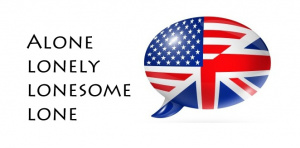Difference between revisions of "Language/English/Vocabulary/Alone,-lonely,-lonesome-and-lone"
< Language | English | Vocabulary
Jump to navigation
Jump to search
| Line 2: | Line 2: | ||
<div style="font-size:300%;"> Alone, lonely, lonesome and lone</div> | <div style="font-size:300%;"> Alone, lonely, lonesome and lone</div> | ||
==Alone means ‘without others around’. Lonely (and informal American English lonesome) means 'alone and unhappy because of it’== | |||
Compare: | Compare: | ||
| Line 12: | Line 12: | ||
==Alone can be emphasised by all== | |||
Example: | Example: | ||
| Line 20: | Line 20: | ||
==Alone is not used before a noun. Lone and solitary can be used instead; lone is rather literary== | |||
Example: | Example: | ||
*The only green thing was a lone/solitary pine tree. | *The only green thing was a lone/solitary pine tree. | ||
Revision as of 12:42, 23 September 2020
Alone, lonely, lonesome and lone
Alone means ‘without others around’. Lonely (and informal American English lonesome) means 'alone and unhappy because of it’
Compare:
- I like to be alone for short periods.
- But after a few days I start getting lonely/lonesome.
Alone can be emphasised by all
Example:
- After her husband died, she was all alone.
Alone is not used before a noun. Lone and solitary can be used instead; lone is rather literary
Example:
- The only green thing was a lone/solitary pine tree.
